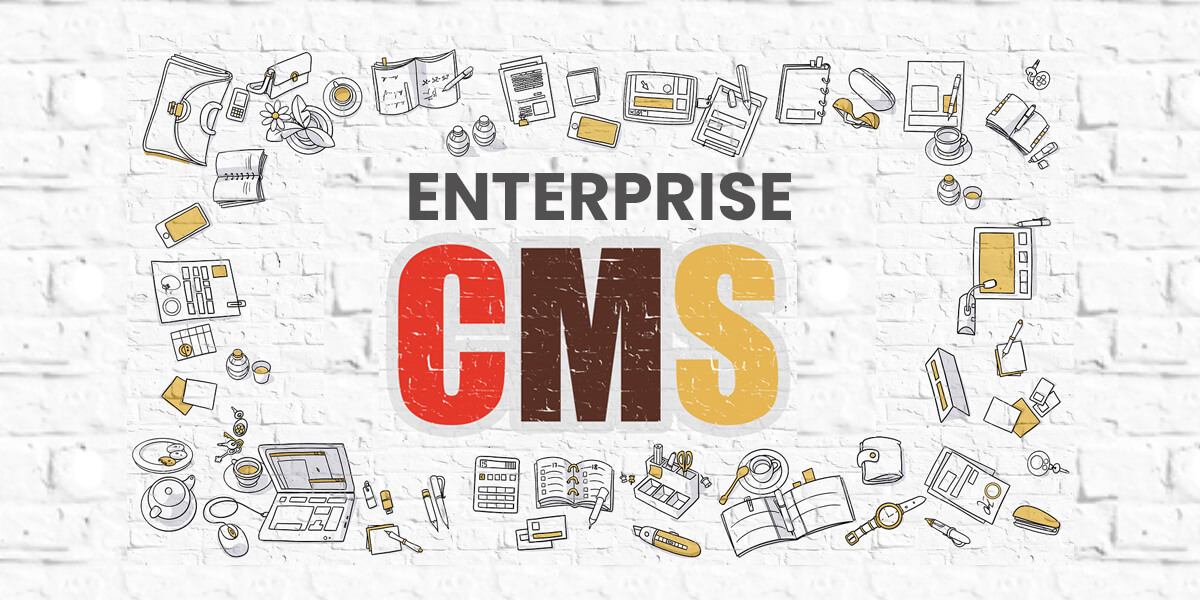10 Crucial Enterprise CMS Features that You Must Integrate
- Web
- June 15, 2018
People often get confused on two terminologies CMS and ECMS. The Content Management System or CMS is actually the software that is usually used to develop, edit, publish and manage the content systematically with the help of web and IP technology. The formidable examples include WordPress, Drupal, and Joomla etc.
The term Enterprise Content Management System (ECMS) might seem new to some people. The Enterprise content management (ECM) is literally defined as the combined set of strategies, tactics, and tools that help any business organization to manage, store or secure the vital information and entire lifecycle of enterprise’s content.
This content information may be available in any format such as Word Doc, Excel spreadsheets, power-point presentations, PDF files, scanned images or videos etc. The ECMS is more than useful in improving the security of important documents and enhancing the employee’s productivity as well as bettering the customer services.
So, let’s get through the essential Enterprise CMS features:
1. Should have a Modular Approach
The enterprise CMS should have the modular capacity. This means that you have to make your web content management flexible so that the administrators can edit, design and move parts in accordance with the requirement of the business enterprise. In addition, they can also manage the notification for tasks, administer various sites and platforms.
However, if you are looking forward to getting the best Rest on Investment, then you have to also think necessarily about updating the Enterprise CMS and adapt the technological demands.
It is also important that the CMS is smart and quick enough to adopt the changes in designs and reflect those in the search engine as well.
2. Maintaining a Strong Security System
Security of the Enterprise CMS is one aspect that needs to be prioritized. With the passage of time, the number of content providers is increasing and this creates some sort of risks as far as security of the information is concerned. One of the prerequisites that you have to plan here is to update your security on regular basis. It must be ensured that the security patch is covering the Common Vulnerabilities and Exposures (CVE).
When you are offering a robust security to the Enterprise CMS, you are not only safeguarding your valuable business data but also protecting your customer’s trust that the content is safe.
However, you must check that the security management system is above or beyond the industry standard and what the platform it supports is. It is extremely crucial to analyze whether the security management will prove effective for your business or not.
3. Tracking the Analytics of your Content
The next important Enterprise CMS is tracking the performance of your content and monitor how your content is being received by the audiences. Essentially, the administrator can make use of some of the popular analytics tools such as the Google Analytics. It allows you to track your KPIs (Key Performance Indicator) directly from the dashboard.
You can actually evaluate the performance of your content by looking at the number of views and shares or comments. The CMS has to integrate formidably with the effective analytics.
However, you need to understand well what type of content will appeal your target audience and convince them to buy products. The benefit of using integrated analytics is that you can personalize the experience of your users and provide what they are looking for.
4. Enterprise CMS should be Scalable
Well, this one of the pivotal aspects of the top enterprise CMS. You have to carve out the best possible ways to make your content look highly scalable and redundant. However, if you want to achieve your ends, then you have to delve deep into the architecture and understand the functioning of the platforms.
However, scaling can be a difficult task due to integration of CMS platforms. You may find it challenging to load balance a system as you need to connect the database for a page to function.
But then the important role of decoupling that makes scaling easier due to the presence of the administrative tools and logic, which separates the tools from front-end user experience.
5. Implementation of the Social Media
The business organizations must understand to utilize the immense potentialities of social media platforms in order to communicate with a larger base of audiences. That’s where the integration of social media becomes necessary for Enterprise CMS.

You have to simplify the process of adding the social media buttons to any site so that the content can be shared with ease. However, it should be made sure that the content is highly optimized before its being shared. You can also encourage your users to share the content.
6. The Importance of Publishing Controls
The publishing controls has become a vital feature of the enterprise CMS. Now, the question is how? This is supposed to be one of the final drafts of the content within the Enterprise CMS that highlights the core facets of the company and the website.
One can cite the example of WordPress has a well- experienced team of authors, editors, administrators and contributors who perform each of their roles separately.
However, you may want the post to be reviewed before it is finally getting published. This means you have the publishing controls on what would go live on your website.
7. A Robust Support System
When you have a business enterprise, it needs to have an extended strong support to deal with CMS related problems. Most of the platforms do not offer adequate support but there are a few exceptions including the popular WordPress and Drupal having an engaged community and forums.
A well connected support system will help the enterprise CMS run optimally without going down and makes navigation faster and seamless.
8. The Option of Multi-Platform Functionality
When you have the option of multi-platform functionality for your business enterprise, there is always a scope to grow.
For instance, if you are operating a second micro-site, then it’s obvious that you will be accessing all your data, content and analytics from the existing website.
However, in case the Enterprise CMS cannot handle more than one site, or if the cost becomes too high, then you cannot think about the multi-platform capabilities.
9. Building Strong Templates for Content
Today we have the concept of Business Process Automation that not only is a time-saver but also improves the processing work. So, templates can effectively prove to be a great helping hand if you want your Enterprise CMS to achieve success. How does this happen?
The templates help in updating the processes after the important step of publishing the grunt work is completed. For instance, in case of publishing a product to a eCommerce site, the template might be useful in resizing the image and create the drop-down list of categories, creating a meta description and so on.
10. Offering Extensive Search Opportunities
You have to make your Enterprise CMS search friendly for the visitors. People will be exploring your site to find a specific answer, most of the times. And, if you are providing them the ideal solution, you are the winner. Be prepared to get high conversion rates.
For example, if you have a travel website and you are able to provide particular information on a tourist spot, which people aren’t getting anywhere, you have scored the winning runs.
Conclusion
With Enterprise Content Management System expanding its base, you need to look out for the features that are suitably satisfying the needs of the users.
The web has indeed become one of the powerful tools that can share the content within shortest time possible.
You have to view how well you can interact with your users through optimal content and provide them with specific substantial information.













